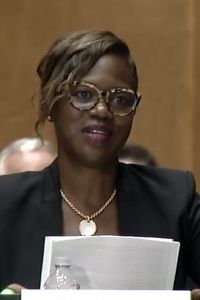Leslie Meek
Leslie Meek is a judge on the Superior Court of the District of Columbia. She was nominated to the court by President Joe Biden (D) on December 15, 2021, and confirmed by the United States Senate on December 15, 2022, by a voice vote.[1][2] Click here for more information on Meek's federal judicial nomination.
The Superior Court of the District of Columbia is a trial court of general jurisdiction in Washington, D.C. To learn more about the court, click here.
Meek was an administrative law judge with the District of Columbia Office of Administrative Hearings.[1]
Judicial nominations and appointments
Superior Court of the District of Columbia (2022-present)
- See also: Federal judges nominated by Joe Biden
On December 15, 2021, President Joe Biden (D) nominated Meek to the Superior Court of the District of Columbia. She was confirmed by a voice vote of the U.S. Senate on December 15, 2022.[1][2] To read more about the federal nominations process, click here.
| Nominee Information |
|---|
| Name: Leslie Meek |
| Court: Superior Court of the District of Columbia |
| Progress |
| Confirmed 365 days after nomination. |
| Questionnaire: |
| Hearing Transcript: Hearing Transcript |
| QFRs: (Hover over QFRs to read more) |
Confirmation vote
The U.S. Senate confirmed Meek on December 15, 2022, by voice vote.[2]
Senate committee hearing
The Senate Committee on Homeland Security and Governmental Affairs held hearings on Meek's nomination on September 21, 2022. Meek was reported to the full Senate on September 28, 2022, by voice vote.[3]
Nomination
On December 15, 2021, President Joe Biden (D) announced his intent to nominate Meek to the Superior Court of the District of Columbia. The president officially nominated Meek on the same day.[1][2]
Meek was nominated to replace Judge Judith A. Smith, who is retiring.[2]
Biography
Education
Meek earned a bachelor's degree from Fisk University in 1987. She earned a J.D. from Case Western Reserve University School of Law in 1990.[1]
Professional career
- 2022-present: Judge, Superior Court of the District of Columbia
- 2014-2022: Administrative law judge, District of Columbia Office of Administrative Hearings
- 2006-2014: Administrative law judge and appellate administrative law judge, Administrative Hearings Division of the District of Columbia Department of Employment Services
- 1995-2003: Assistant general counsel and then general counsel, United Teachers of Dade, Miami, Florida
- 1994-1995: Assistant city attorney, Miami, Florida
- 1992-1994: Assistant general counsel for the Florida Chief Financial Officer
- Miami-Dade State Attorney’s Office[1]
About the court
| Local Courts |
|---|

|
| Trial courts and judges |
| Elections by state |
| Judicial selection by state |
| View courts by state: |
The Superior Court of the District of Columbia resides in Washington, D.C. It is a trial court of general jurisdiction established by the U.S. Congress in 1970.[4]
Click on the links below to learn more about the court's...
The Superior Court handles all local trial matters. This includes topics such as:[5]
- Civil law
- Criminal law
- Family law
- Probate
- Taxes
- Landlord-tenant
- Small claims
- Traffic
The federal nomination process
Federal judges are nominated by the president of the United States and confirmed by the Senate. There are multiple steps to the process:
- The president nominates an individual for a judicial seat.
- The nominee fills out a questionnaire and is reviewed by the Senate Judiciary Committee.
- The Senate Judiciary Committee holds a hearing with the nominee, questioning them about things like their judicial philosophy, past rulings or opinions, etc.
- As part of this process, the committee sends a blue slip to senators from the home state in which the judicial nomination was received, allowing them to express their approval or disapproval of the nominee.
- After the hearing, the Senate Judiciary Committee will vote to approve or return the nominee.
- If approved, the nominee is voted on by the full Senate.
- If the Committee votes to return the nominee to the president, the president has the opportunity to re-nominate the individual.
- The Senate holds a vote on the candidate.
- If the Senate confirms the nomination, the nominee receives a commission to serve a lifelong position as a federal judge.
- If the Senate does not confirm the nomination, that nominee does not become a judge.
See also
External links
Footnotes
- ↑ 1.0 1.1 1.2 1.3 1.4 1.5 The White House, "President Biden Names Eleventh Round of Judicial Nominees," December 15, 2021
- ↑ 2.0 2.1 2.2 2.3 2.4 Congress.gov, "PN1475 — Leslie A. Meek — The Judiciary," accessed December 16, 2021
- ↑ Homeland Security and Governmental Affairs Committee, "Business Meeting on September 28, 2022," September 28, 2022
- ↑ District of Columbia Courts, "About the Superior Court," accessed March 30, 2021
- ↑ District of Columbia Courts, "About the Superior Court," accessed March 30, 2021





